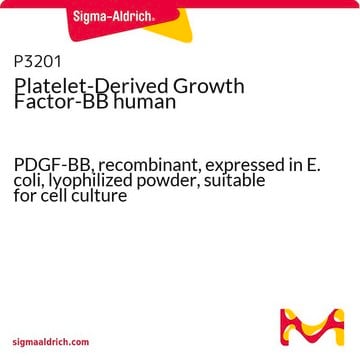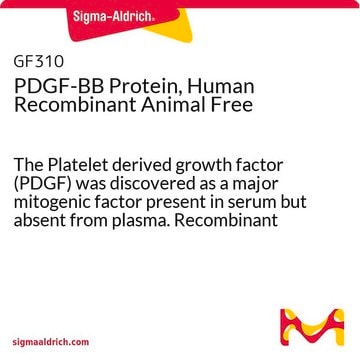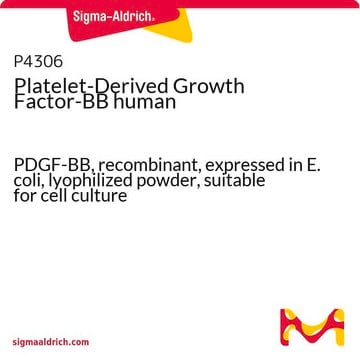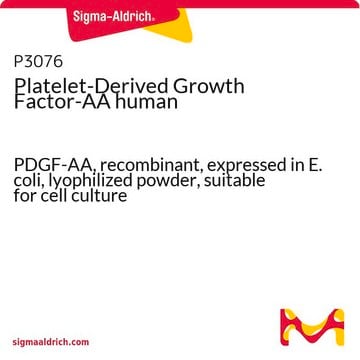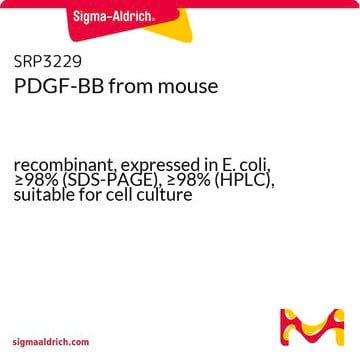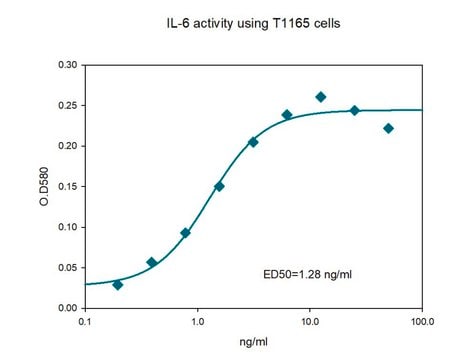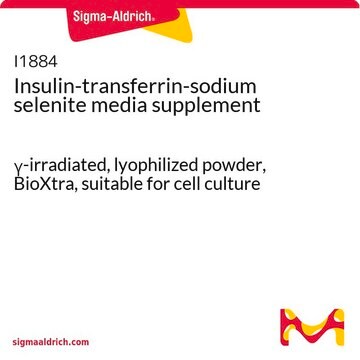GF149
PDGF-BB, recombinant human
The Platelet Derived Growth Factor (PDGF) is a potent mitogen for a wide range of cell types including fibroblasts, smooth muscle & connective tissue.
Synonym(s):
Platelet Derived Growth Factor-BB
Sign Into View Organizational & Contract Pricing
All Photos(1)
About This Item
UNSPSC Code:
12352202
eCl@ss:
32160405
NACRES:
NA.77
Recommended Products
biological source
human
Quality Level
Assay
>98% (SDS-PAGE)
manufacturer/tradename
Chemicon®
technique(s)
cell culture | mammalian: suitable
impurities
<0.1 ng/μg endotoxin (of PDGF-BB; 1EU/μg)
input
sample type neural stem cell(s)
sample type hematopoietic stem cell(s)
sample type mesenchymal stem cell(s)
UniProt accession no.
shipped in
dry ice
Gene Information
human ... PDGFB(5155)
General description
Platelet Derived Growth Factor (PDGF) is a potent mitogen for a wide range of cell types including fibroblasts, smooth muscle and connective tissue. PDGF which is composed of a dimer of two chains termed the A chain and B chain, can be present as AA or BB homodimers or as an AB heterodimer. Recombinant human PDGF-BB is a 24.3 kDa disulfide-linked homodimer of two B chains (218 total amino acids).
Product Source: E. coli
Application
For most in vitro applications, PDGF-BB exerts its biological activity in the concentration range of 0.2 to 10.0 ng/mL. Responding cells are (partial list): fibroblasts, connective tissue.
The Platelet Derived Growth Factor (PDGF) is a potent mitogen for a wide range of cell types including fibroblasts, smooth muscle & connective tissue.
Linkage
Replaces: GF018
Physical form
Sterile filtered solution lyophilized from 10 mM HOAc.
The sterile filtered solution was lyophilized from 10 mM HOAc.
Storage and Stability
The lyophilized PDGF-BB is stable for a few weeks at room temperature, but best stored at -20°C. After a quick spin, reconstitute in water to a concentration of 0.1-1.0 mg/mL. This solution can be diluted into aqueous buffered solutions and stored at 2-8°C for one week or -20°C for future use. Reconstituted PDGF-BB should be stored in undiluted aliquots at -20°C for up to six months.
Analysis Note
Specific Activity: Human PDGF-BB is fully biologically active when compared to standards. The ED50 as determined by its dose-dependent mitogenic activity on BALB/c 3T3 cells is between 6-12 ng/mL.
Legal Information
CHEMICON is a registered trademark of Merck KGaA, Darmstadt, Germany
Disclaimer
Unless otherwise stated in our catalog or other company documentation accompanying the product(s), our products are intended for research use only and are not to be used for any other purpose, which includes but is not limited to, unauthorized commercial uses, in vitro diagnostic uses, ex vivo or in vivo therapeutic uses or any type of consumption or application to humans or animals.
Certificates of Analysis (COA)
Search for Certificates of Analysis (COA) by entering the products Lot/Batch Number. Lot and Batch Numbers can be found on a product’s label following the words ‘Lot’ or ‘Batch’.
Already Own This Product?
Find documentation for the products that you have recently purchased in the Document Library.
Customers Also Viewed
Karla Lucia F Alvarez et al.
STAR protocols, 3(1), 101149-101149 (2022-02-11)
Here, we present a protocol to culture primary human vascular smooth muscle cells (VSMCs) under Alzheimer's disease (AD)-like conditions, including steps for morphological characterization with microscopy. We then describe functional assays, including wound healing, transwell, coculture, and supernatant assays, to
Yi Ma et al.
Journal of cellular and molecular medicine, 25(11), 5202-5219 (2021-05-05)
Pulmonary arterial hypertension (PAH) featured a debilitating progressive disorder. Here, we intend to determine diagnosis-valuable biomarkers for PAH and decode the fundamental mechanisms of the biological function of these markers. Two mRNA microarray profiles (GSE70456 and GSE117261) and two microRNA
Lifeng Jiang et al.
Frontiers in medicine, 9, 886868-886868 (2022-07-16)
Hyper-proliferation of pulmonary arterial vascular smooth muscle cells (PAVSMC) is an important pathological component of pulmonary vascular remodeling in pulmonary arterial hypertension (PAH). Lipogenesis is linked to numerous proliferative diseases, but its role in PAVSMC proliferation in PAH remains to
Xunde Xian et al.
eLife, 6 (2017-11-17)
Low-density lipoprotein receptor-related protein 1 (LRP1) is a multifunctional cell surface receptor with diverse physiological roles, ranging from cellular uptake of lipoproteins and other cargo by endocytosis to sensor of the extracellular environment and integrator of a wide range of
Zili Zhang et al.
BioFactors (Oxford, England), 47(5), 801-818 (2021-06-16)
Targeting the elimination of activated hepatic stellate cells (HSCs) and blocking excessive deposition of extracellular matrix are recognized as an effective strategy for the treatment of hepatic fibrosis. As a newly discovered programmed cell death mode, the regulatory mechanism of
Our team of scientists has experience in all areas of research including Life Science, Material Science, Chemical Synthesis, Chromatography, Analytical and many others.
Contact Technical Service